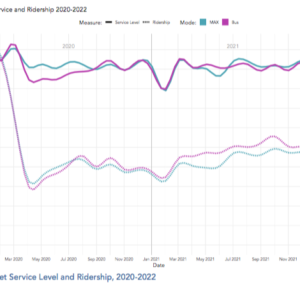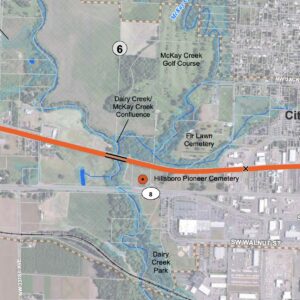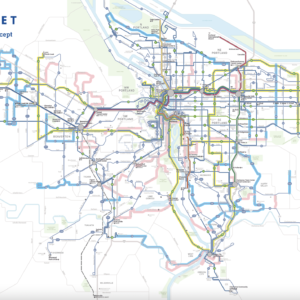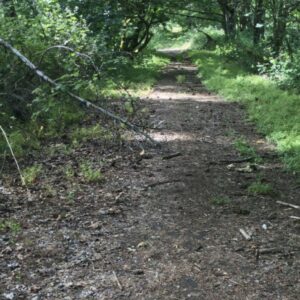
motorized vehicles in nearly 4,000 miles of
eastern Oregon forest land have been
put on pause.
(Photo: US Forest Service)
A management plan released last month by the Wallowa-Whitman National Forest that would have prohibited motorized travel on nearly 4,000 miles of eastern Oregon backcountry roads, has been withdrawn.
In a statement released yesterday, Wallowa-Whitman National Forest Supervisor Monica Schwalbach said she has decided to “stop the clock” on the plan in order to, “be sure the various options for moving forward are considered in a constructive manner.”
While many people the plan was a step in the right direction — including the director of Cycle Oregon Jerry Norquist who said it was a “good decision” due to the environmental damage being caused by motor vehicles — other forest users who ride ATVs, and drive cars and trucks on the roads have complained loudly.
Schwalbach addressed this outcry in her statement:
“As I have listened to the many people who are commenting on the plan, it has become apparent that there is a good bit of confusion, as well as some concerns that would benefit from more discussion… The forest needs to develop a travel management plan for public motorized recreation, but I want to be sure the various options for moving forward are considered in a constructive manner.”
Pete Sandrock is a Portland resident and self-described “daily cyclist” who is also on the Board of Directors of the Hells Canyon Preservation Council. Schwalbach’s statement made no mention of being contacted by politicians, but Sandrock says the USFS withdrew the plan “under pressure” from Oregon’s congressional delegation. Opposition to the plan was led by U.S. House Representative Greg Walden, a Republican who represents Oregon’s second district, in addition to Senate Democrats Ron Wyden and Jeff Merkley,
Rep. Walden says the Forest Service’s plan is, “the product of a flawed public process that failed to protect the public’s ability to enjoy their natural resources.” “Time to scrap it and try again,” Walden said in a phone call to the USFS he shared on his Facebook page, “with people in charge who will value the suggestions of eastern Oregon’s citizens.”
Sandrock disagrees with Walden and with the decision to withdraw the plan, saying that the USFS documented more than 3,000 public comments, many from local opponents to the plan and “ATV enthusiasts.” “They also responded to each of the 290 issues raised by commenters in a detailed 90-page appendix to the Environmental Impact Statement,” Sandrock said in a letter to The Oregonian. Here’s more from Sandrock:
“The problem for the opponents is that they ignored the plain requirements of the 2005 Bush Administration directive that all national forests develop travel management plans the are environmentally sensitive and reduce road maintenance costs.”
The USFS hasn’t provided details or a timeline on where the plan will go from here. For more information, read Schwalbach’s statement and check out local coverage in the Baker City Herald.





It was a poorly executed plan which alienated a good portion of the actual land users in and around the Wallowa-Whitman area, including people who owned and accessed adjacent property, people who relied on the forest for firewood/heating, etc. The maps they provided were completely inadequate in allowing local residents to understand what areas would be closed. A good decision overall for now. Partial closures, rolled out over time, would have been a much more effective and palatable strategy. Whether people in Portland like it or not, this was the right decision and represents what people who live in E. Oregon and would be directly affected by the closures want. Kudos go to all the congressional reps. who made it possible. Hopefully they can come up with a better plan in the future.
Whether we like ATV users or not, we have to share public lands with them. This can be done in a responsible way that doesn’t alienate them.
I don’t think it is taking too crazy of moral high ground to say motorized activities should be at limited/discouraged in National Forests.
I do. Public land and National Forest != Wilderness. Environmental preservation and protection should be a priority of the National Forest Service, but not the only one. Cattle grazing, forest products, hunting, and yes, motorized recreation have a place there.
If you would like to expand Eagle Cap Wilderness to cover more of the Wallowas, you’re free to make that case. But slowly converting national forests to Wilderness-Lite is not the way to do it.
I’m happy to share public lands with ATV users as long as they leave their stinky, noisy ATVs at home.
Given the size of the national forests, banning motorized access would mean that some areas are completely inaccessible, no? Does that square with their use as recreation areas? Not a fan of irresponsible motor vehicle use in the back country, but I think there’s room for everyone. Remember, for every MTBer who wants ATVs banned, there’s a hiker who wants MTBs banned.
“Given the size of the national forests, banning motorized access would mean that some areas are completely inaccessible, no? ”
Not sure why you say that. The range of someone on a bike could be hundreds even thousands of miles. You could even haul firewood out with a bike and trailer if you were determined.
have you ever even stepped foot in the Wallowa region?
I’d like to watch you try to haul between 3-6 cords of wood out of those mountains with your bicycle. I’d seriously enjoy the show.
As a matter of fact I have. I biked through it twenty years ago. 3-6 cords is a lot. I don’t need nearly that much to heat my house (anymore). When you haul, cut, split, & stack wood (mostly) under your own power you quickly discover that adding insulation to your walls is far easier.
As for hauling firewood by bicycle, I said ‘for the determined.’ I predict the day will come when this won’t seem as fanciful as it admittedly does in our fossil-fuel drenched country today. Every day people haul firewood out of the woods under their own power the world over. We’ve just forgotten what it feels like.
Cycling hundreds or thousands of miles in the backcountry, while presumably living off the land? (Pretty hard to carry enough food to ride thousands of miles in the wilderness.) Sure, it’s technically possible, but then, so is going to the moon.
My point is, if it’s a national forest (as opposed to a protected wildlife reserve) it doesn’t seem to me that the desired objective is to make access so difficult that only a tiny minority can experience the area. I understand that you may see that as the optimum outcome, but we disagree on that point.
I think this comment, and many like it, are based on the *wrong* assumption that the forests come naturally with roads. In fact, even a minimal understanding of the history of the National Forest system will show that the roads were built (by taxpayer dollars) to provide a free access point for for-profit logging companies to “purchase” the trees at well below the market price. The idea that the entire forest needs to be “accessible” (it is certainly accessible, if not by all humans all the time, then by other species that live there) is misguided. I was and remain all for a motorized ban on most forest areas–there are plenty of paved roads and well used dirt ones (that would not have been affected by this rule) for people to recreate or forage or wood gather.
Additionally, I reject the notion the only those people that live in direct proximity to forests are “directly affected” by policies about them. There are plenty of Portlanders that pay taxes and have a vested interest in NATIONAL forests–and certainly there is ample evidence that those that live in proximity of a natural resource cannot and do not manage the resource in a sustainable way.
They were also built to provide access for fighting fires, after events like the Storey Burn showed the need to manage wildfire. While you might be able to legislate the forest products industry out of existence (at least on public lands), I don’t think you’ll have much luck getting lighting and dry tinder to behave.
You are right that roads were built to suppress fire, however, the story is much more complex. The rationalization for fire suppression roads was to ensure that the “timber was not lost in a major conflagration” (http://www.foresthistory.org/ASPNET/Policy/Fire/Forest_Roads_or_fire.pdf). The forest service has historically and presently thought of the forest as a repository of future lumber. Many of the roads that were built for fire suppression then, would NOT be built today as the USFS is, in theory, allowing some fire to burn naturally. Anyone that knows anything about forest health would gladly have natural fire (which replenishes and renews the forest) and less gladly have motorized vehicles (which bring environmental damage, pollution, human caused fire, and unrestrained extraction).
Keep in mind you have benefited from the logging that has occurred.
MOTRG–of course I have benefited from the logging that has occurred, but that does not mean that I should ignore that the manner in which the logging was done. My point about the road building program is that like many other industries, both now and in the past, the government created massive subsidies (either direct tax breaks or, as in the case of the USFS footed the bill for expensive road building that logging companies had exclusive rights to) that led to artificially lower prices on goods. Had logging companies had to build their own roads, there would no doubt be fewer roads fragmenting our forests, as well as larger stands of old growth forest left. I do not object to logging–but I do object to unrestrained, subsidized, environmentally destructive logging practices. This discussion isn’t about logging anyway, but the roads that were built to support logging–and which should now be allowed to return (at least partially) to the forest from whence they came.
9watts- I believe Dan was being a realist. Expecting all our Eastern Oregon brethren to only access the forest on a bicycle is laughable.
(I mean, it’s a nice thought, just never ever gonna happen!)
Also, his point about there being plenty of plenty of hikers (and equestrians) who would like to see MTB access taken away is right on the money.
I hear you, but ‘completely inaccessible’ doesn’t capture ‘cultural disinclination to use human-power to go into the woods’ at least for me.
And we could debate which of the alternatives under discussion is ‘never gonna happen,’ or is on its way out regardless of the political wranglings under way.
A determined cyclist could bike across the ocean, too.
That is what sailboats are for. No need to complicate things.
I’m not too surprised by this decision, nor that the previous decision caused an uproar. Hopefully we can move towards a middle-ground plan where a large share of the road mileage currently open to motor vehicles is phased out over time.
Someone had all of Oregon’s Pacific coastline classified as highway but the are still some restriction and some outright exclusions of both location and time for motor vehicles.
Could that tactic be applied here?
I was under the impression that the decision was budgetary in nature? There has to be a cost element to this, as the forest service has responsibility at some level for the condition of these roads, signs, maps, etc. Wasn’t one of the arguments that they wouldn’t have the resources to provide assistance to distressed users on some of these remote roads?
No doubt all those Eastern Oregonians who want the right to drive wherever they please on public lands will be ponying up the extra tax dollars to maintain all those miles of roads and mitigate all the environmental destruction. RIght?
You don’t seem to understand the definition of “public” lands.
Public lands means that they are owned by all of us, not just the people who live nearby. Public lands means that we all have to share them, and that we have to mitigate the impact our activities have on both the resources and the other users. And finally, public lands means that we all share in the costs of upkeep.
Public lands does not mean that you get to inflict your “freedoms” on everyone else.
So what exactly am I missing?
“Public lands does not mean that you get to inflict your “freedoms” on everyone else.”
nice turn of phrase.
You are missing the point where you are trying to inflict your opinions on them.
How about the Western Oregonians who want the right to drive on public lands?
I have a truck camper that is larger than I can tow on a bicycle, and Eastern Oregon is too far away for my vacation time to allow me to bicycle there and back.
I would like to be able to go with my family and enjoy truck camping in our public lands, without having to either give up everything and become a hermit or win the lottery so I can have the time off work so I can walk everywhere.
Roads and motorized access are not evil. Just regulate how they are used, and maybe charge fees and permits for use – require that users have stickers showing they have paid the fees. Like a snow park permit, or an Oregon OHV permit.
I don’t get why everything has to be an all or nothing with this crowd.
Oh, and I do live in the urban core cycle for transportation around Portland .
I don’t know why you think anyone is making an “all or nothing” argument. All I would like to see is some semblance of balance and for the true costs of motorized recreation to be better borne by those who enjoy it.
If anything, I see a chicken-little attitude on behalf of those who see any attempt at regulating motorized activities as evil Big Government taking away all their freedoms. Do you seriously think you will see a day when you can’t drive your truck somewhere and camp?
Within a hundred miles of Portland there are literally thousands upon thousands of miles of backcountry roads that are entirely open to motorized use, a privilege (as opposed to a right) for which, by and large, you do not pay one cent beyond the taxes we all pay. And that’s not to mention the thousands of acres of public right-of-way in our neighborhoods and towns that we give over to cars.
I like to backpack and I like to car camp. Sometimes I drive, sometimes I ride my bike. That doesn’t mean I should be allowed to drive everywhere and car camp anywhere.
Similarly, people who depend on the forest for livelihood or necessities should be willing to submit to some reasonable degree of regulation like everyone else.
In his opening comment, Jeff made a good point that the maps accompanying the original plan were inadequate. The Forest Service needs to correct the deficiency as soon as practicable.
For the sake of the debate, here is some additional information about the plan:
1. 4,300 miles of roads and OHV trails will remain open; 3,896 will be “closed.” 75% of the closures will be roads that are in disrepair and closed by earlier but enforced decisions.
2. Off-road cross-country travel will be banned in the Wallowa Whitman. This isn’t unique to this particular forest. Every national forest in the nation is required to ban such travel.
3. Exclusive OHV and motorcycle trails will increase from 332 to 404 miles.
4. Road access to private property, public land grazing allotments, and mining claims will not be reduced.
5. Stream crossings will decline from 12,899 to 5,641. Stream crossings on OHV trails will decline from 698 to 693.
6. Firewood removal, by permit, will be available within 300′ of open roads.
I hope this information helps further the discussion. And to answer those who might feel that a Portland cyclist like me should not butt into this debate, I offer this context: for more than 25 years I have backpacked, birded, skied, bicycled, climbed, and pulled barbed wire with friends and family in Hells Canyon, Imnaha Canyon, the Wallowa, Blue, and Elkhorn mountains, and the Zumwalt Prairie. I am the great grandson of Oregon homesteaders. I love the land and I respect the feelings of eastern Oregonians who continue to suffer economic pain. Let’s look for common ground.
In my point #1, I meant to say that 75% of the closures affected roads that were closed by earlier but UNenforced decisions.
That’s really good info, Pete. Thanks for that. I think one of the saddest things about issues like this is the way politicians and media use them to create a (largely fictional) divide between urban and rural. Of course, divide and conquer is the oldest strategy in the book. Mainly because it works.
I agree that this issue gets oversimplified in the Rural/Urban split, but also in the Drive/Bike split. As Pete so clearly pointed out, there is no movement, nor would there likely be a movement, to ban all motorized vehicles from all of the forest. Instead, this is a move to bring the policy closer to the ability of the USFS to maintain the degrading roads that exist. I also drive–and I have a VW van that I love to drive into the national forest system and camp, I have purchased a permit and harvested my home’s firewood from the national forest, I have foraged for mushrooms in the forest, AND I don’t think I should be able to drive anywhere I damn well please. In the same way I don’t want all motorized access to go away, I don’t think it is reasonable to expect unlimited access. The USFS giveth (roads all over the place) and the USFS taketh away (albeit a tiny percentage of what they gaveth).
speaking of predictable misunderstandings, when someone says ‘cars won’t be with us forever, lets not pretend otherwise when making laws or fiddling with infrastructure’ someone else invariably hears ‘he’s trying to take my car away/ban driving in Nat’l Forests.’
The former is a prediction based on anticipated availability and cost of gasoline (that one can have a discussion or argument about), whereas the latter is, well, something entirely different.
This is really unfortunate. A forest cannot survive via mob rule.
It seems to be working well in Haiti… oh wait…
http://en.wikipedia.org/wiki/Deforestation_in_Haiti
ohv are the honda’s and suzuki’s etc. so lets start with boycott of those companies until advertising is responsable about destroying the backcountry.